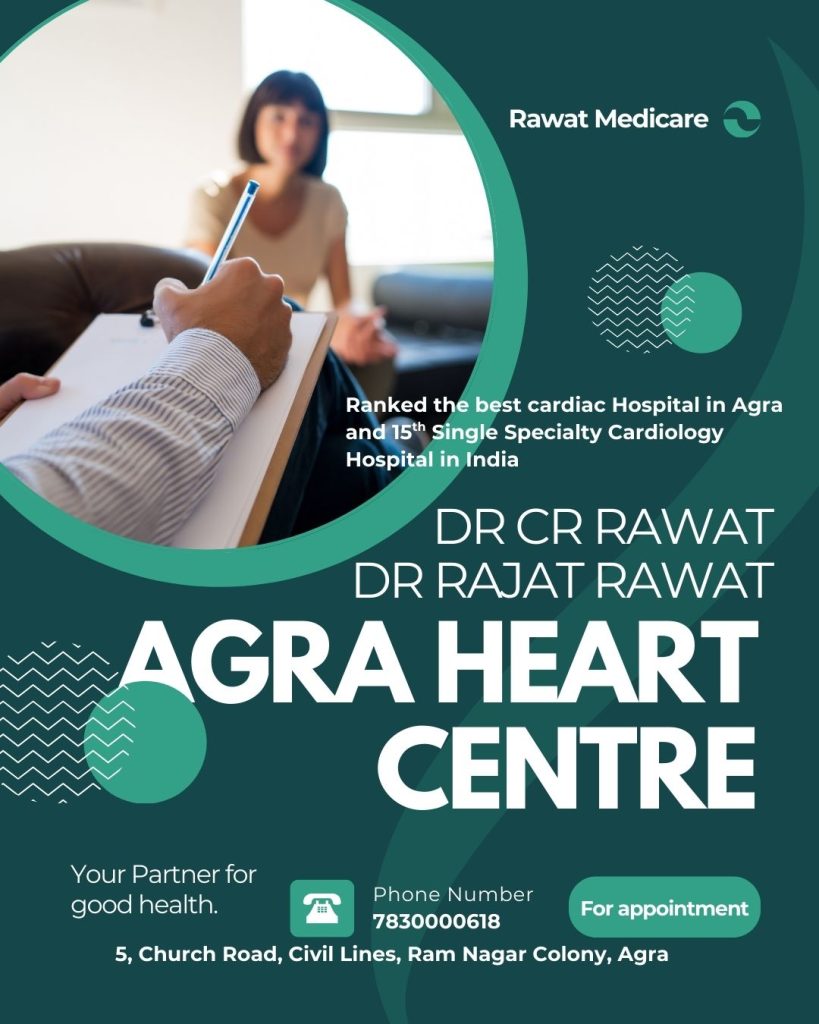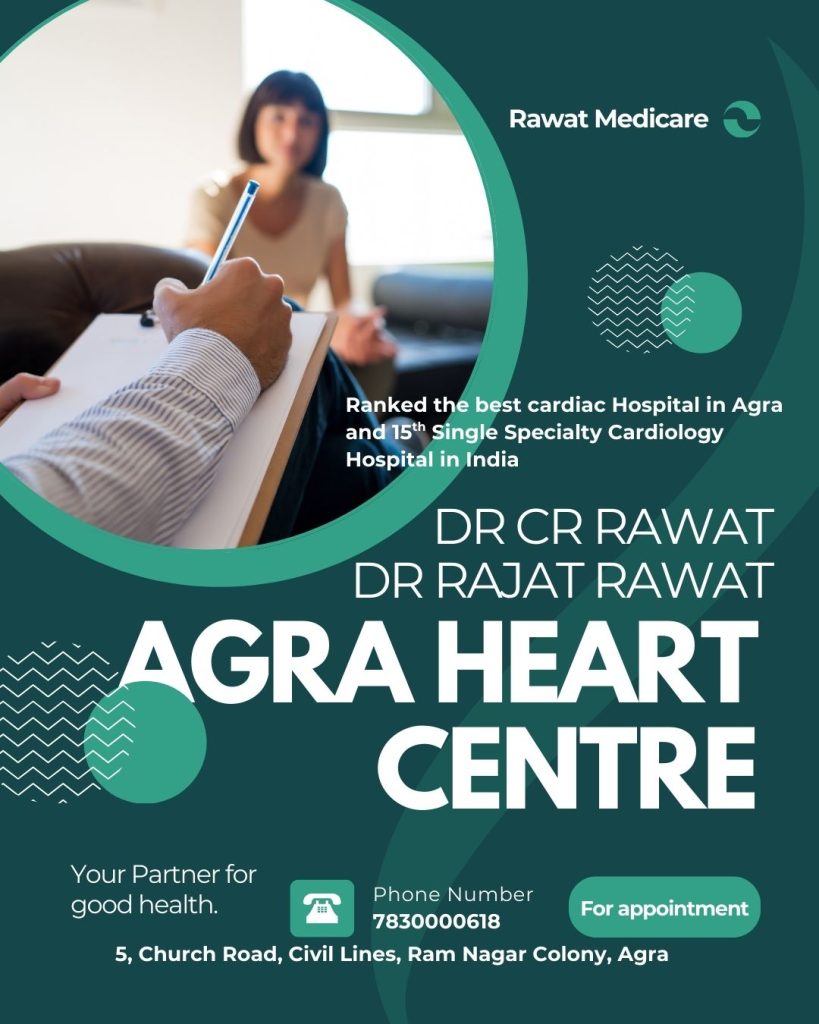
Renal Denervation Therapy (RDN) in Agra
Why Dr. Rajat Rawat Is the Best Doctor for Hypertension and Renal Denervation Therapy in Agra?
High blood pressure (hypertension) is one of the most common — and most under-treated — risk factors for heart attack, stroke, kidney disease and heart failure. For most people, lifestyle changes and medications control blood pressure well. But a meaningful minority of patients have resistant or difficult-to-control hypertension despite optimal medical care. For those patients, modern, catheter-based renal denervation (RDN) has emerged as an important, evidence-backed option. If you live in Agra and are considering advanced hypertension care including renal denervation, Dr. Rajat Rawat at Agra Heart Centre is the physician to consult — here’s why. (Lippincott Journals)
What is renal denervation — a short, practical explanation
Renal denervation is a minimally invasive, catheter-based procedure performed by an interventional cardiologist or endovascular specialist. Using a small catheter inserted through the groin or wrist, controlled energy (radiofrequency, ultrasound or other energy modalities) is applied to the nerves running along the renal arteries. Interrupting sympathetic nerve signals can lower blood pressure chronically, often by an amount comparable to adding one antihypertensive drug. Multiple randomized, sham-controlled trials (SPYRAL, RADIANCE and others) have shown clinically meaningful reductions in office and 24-hour ambulatory blood pressure after RDN. These results have moved RDN from experimental to an accepted option for carefully selected patients. (The Lancet)
Why procedure choice and operator experience matter
RDN is a precision procedure: procedural technique, energy delivery pattern, and patient selection all influence outcomes. That’s why choosing an experienced interventional cardiologist matters — you want a clinician who understands hypertension management, renal artery anatomy, device selection, peri-procedural safety, and long-term BP follow-up. Dr. Rajat Rawat combines advanced interventional skills with deep clinical expertise in hypertension care, so patients receive both careful selection and high-quality procedural technique.
Dr. Rawat’s training and experience in complex coronary and structural heart interventions give him excellent procedural dexterity and a firm grounding in catheter-based therapies — skills that translate directly to safe, effective renal denervation.
Who benefits from renal denervation?
Patient selection is the key to good outcomes. Current consensus and guideline documents recommend considering RDN for the following groups (summary of international guidance and trial eligibility):
- True resistant hypertension — patients whose blood pressure remains uncontrolled despite three or more antihypertensive agents (one of which should be a diuretic) at maximally tolerated doses, and after secondary causes have been excluded. (EuroIntervention)
- Uncontrolled hypertension despite multiple drugs — patients on two or more drugs with persistently elevated ambulatory blood pressure who prefer a device-based option or have poor medication adherence. (scai.org)
- Medication intolerance — when side effects or contraindications prevent patients from taking effective drug combinations, RDN can be considered as an adjunct to reduce pill burden and improve BP control. (American College of Cardiology)
- Patients with preserved kidney function — most guidelines and trials evaluated patients with eGFR above certain thresholds (commonly >40 mL/min/1.73 m²), so careful renal function assessment is required before referral. (American College of Cardiology)
- Appropriate renal artery anatomy — pre-procedure imaging (CT angiography or MR angiography) is used to confirm suitable renal artery size and absence of anatomic issues (severe stenosis, previous stents in the renal artery, etc.). (AHA Journals)
Dr. Rajat Rawat follows an evidence-based, stepwise evaluation: confirm true resistant hypertension with office and 24-hour ambulatory BP monitoring, rule out secondary causes (sleep apnea, primary aldosteronism, renal artery stenosis, pheochromocytoma, etc.), assess medication adherence, and obtain renal artery imaging to ensure anatomical suitability. This disciplined approach ensures only patients likely to benefit undergo the procedure.
Evidence that renal denervation works — the short takeaways
Modern sham-controlled trials show that RDN reduces both office and ambulatory blood pressure, with effects that are durable in follow-up analyses. Meta-analyses and guideline updates now recognize RDN as a reasonable adjunct for selected patients with resistant or uncontrolled hypertension. Importantly, trial data show RDN’s BP-lowering effect is roughly similar to the addition of one antihypertensive drug — a meaningful reduction for high-risk patients. Safety profiles across major trials and registries have been favorable when performed by experienced operators in suitable patients. (The Lancet)
Why Dr. Rajat Rawat is the best choice in Agra
- Clinical and procedural expertise. Dr. Rawat’s advanced interventional training and hands-on experience with complex catheter procedures translate directly to renal denervation: safe vascular access, precise catheter manipulation, and meticulous energy delivery. (Dr. Rajat Rawat’s training includes advanced fellowships in complex coronary and structural heart interventions.)
- Comprehensive hypertension program. At Agra Heart Centre, Dr. Rawat leads integrated care: cardiology evaluation, 24-hour ambulatory BP monitoring, laboratory work-up for secondary causes, renal artery imaging, medication review and shared decision making — all crucial steps that maximize RDN success and safety.
- Patient-centered counseling. RDN is not a first-line treatment. Dr. Rawat spends time explaining risks, expected benefits (including realistic BP targets), and follow-up plans. This patient-focused counseling ensures informed consent and sets correct expectations.
- Follow-up and medication optimization. Post-procedure care matters. Dr. Rawat’s follow-up protocol includes ambulatory BP monitoring, medication adjustment, renal function monitoring, and lifestyle support — a complete pathway that turns procedural gains into long-term cardiovascular risk reduction.
- Track record with high-risk patients. Whether patients come with resistant hypertension, medication intolerance, or poor adherence, Dr. Rawat’s multidisciplinary approach and procedural skill make him ideally placed to deliver durable BP control with safety.
What to expect if you’re referred for renal denervation
If Dr. Rawat determines you may benefit from RDN, the typical pathway is:
- Detailed evaluation — confirm resistant/uncontrolled hypertension with ABPM, screen for secondary causes, review medications and adherence. (PMC)
- Pre-procedure imaging — CT or MR angiography of renal arteries to confirm anatomy. (AHA Journals)
- Shared decision-making — risks, benefits, alternatives and realistic BP goals are discussed. (scai.org)
- Procedure — minimally invasive, usually under local anesthesia or light sedation; most patients go home the same day or after an overnight stay depending on local practice. (The Lancet)
- Follow-up — ABPM at pre-specified intervals, renal function checks and medication review to evaluate the BP response and adjust therapy. (AHA Journals)
Who should not have RDN (briefly)
RDN is not appropriate for everyone. Patients with advanced chronic kidney disease below guideline eGFR thresholds, unsuitable renal artery anatomy (eg, severe atherosclerotic disease or small arteries), and uncontrolled secondary hypertension until the underlying cause is corrected, are not candidates. That’s why careful pre-procedure workup under an experienced clinician is essential. (American College of Cardiology)
Real-world benefits beyond BP numbers
Lowering blood pressure reduces the risk of heart attack, stroke, and heart failure over time. For patients who struggle with medication side effects, pill burden, or inconsistent adherence, RDN offers a low-maintenance adjunct that can meaningfully lower ambulatory pressures and improve quality of life. Recent guideline updates and expert consensus statements now recognize RDN as an important tool in the armamentarium for selected patients with difficult-to-control hypertension. (EuroIntervention)
Ready to discuss whether you’re a candidate?
If you live in or near Agra and are struggling with resistant or difficult-to-control hypertension — or you experience intolerable medication side effects — schedule a consultation with Dr. Rajat Rawat at Agra Heart Centre and Multispecialty Hospital. Dr. Rawat will perform a thorough, evidence-based evaluation and explain whether renal denervation is appropriate for you.
Agra Heart Centre & Multispecialty Hospital — Contact details
Address: 5, Church Road, Civil Lines, Ram Nagar Colony, Agra.
Phone: 7830000618, 0562-2850356.
(When you call, ask about ambulatory (24-hour) BP monitoring and renal artery imaging — these are essential first steps in any RDN evaluation.)
Final note
Renal denervation is no longer an experimental idea — modern trials and international consensus have established its role for carefully selected patients with resistant or uncontrolled hypertension. Choosing the right center and operator matters. With advanced interventional training, a systematic, guideline-driven evaluation pathway, and a patient-centered approach, Dr. Rajat Rawat at Agra Heart Centre is uniquely positioned to deliver safe, effective renal denervation therapy in Agra. If you or a loved one meet the criteria described above, consider booking an evaluation — informed decisions today can prevent strokes and heart attacks tomorrow. (The Lancet)

Other Links: https://www.agraheartcentre.com/crtd-device-therapy-for-advanced-heart-failure-in-agra/
